Grigou said:
elm70 said:
...
One final thing, first time I check with evbatmon my battery capacity was reported to be 36ah, 2 months ago was 35.9 and now is stated 35.8.. So it seems my PHEV lose 0.1Ah every 2/3 months
Personally I think B5 regen brake may not help, so I will now use B0 and see if battery degradation will get better
Not bad at all.
See Anko's degradation ... and mine is more than 0,1 Ah per month

I think B5 doesn't help too, but I don't want to stay in B0 all the time and B5 is a great thing in mountain !
I'm driving on flat roads, so use B0 is not an issue, except I need to move more my right foot .. driving in B5 is more "relaxing" .. possibly I will be back to B5 in winter when snow will be on the streets
The eco leaves indicator now is more prompt to give me 4 leaves using B0, so in theory the car belive I'm driving more efficiently now ... I will keep this B0 for next 6 months .. and I will check if this did help .. even if can't be really a conclusive result
I bet my battery is in relative good condition, especially for the age (my PHEV is a Dec 2013 with 125.000 km), since the previous owner did damage the charger and hewas possibly running all time in petrol/hybrid mode, possibly always in normal / B2 mode .. plus it has been sitting unsold for 4/5 months with SOC in ideal 30%
Anyhow .. I just check the video of the PHEV battery disassembly ... replace the PHEV in car battery does not sound something easy and not really accessible with home tools ... so ... the only possible solution is to have an additional battery in parallel to the car one ... something discussed some time ago ...
Still .. on my daily commute I have 10 to 20km spare range ... so for me & for now, I don't need to mess with my PHEV
When my range will be so bad that I need to use ICE for my daily car usage, then I will consider this option which we did discuss some months ago on this forum. Ideally the PHEV battery can have still 65% battery capacity left after 10y .. so ... maybe I will never have to mess with it .. but ... for how battery degradation is moving .. not sure I will get 65% in 7y from now


































